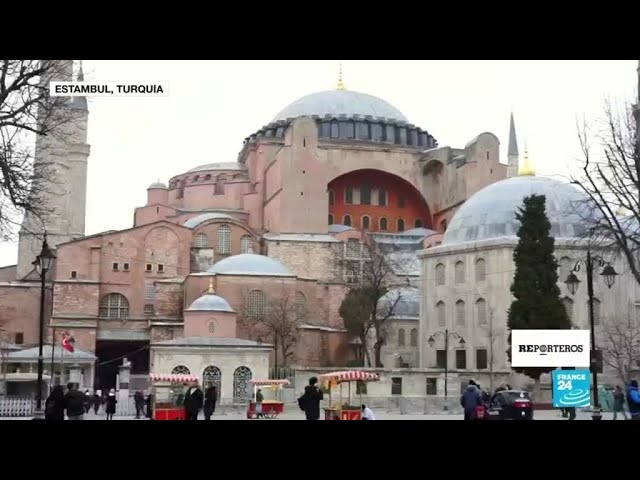
Exploring Turkey’s Religious Diversity
✨ Exploring Turkey’s Religious Diversity ✨
🕌 Turkey, a country located in both Europe and Asia, is known for its rich cultural heritage and historical significance. One aspect that contributes to its captivating charm is its religious diversity. With a population that embraces different faiths and beliefs, Turkey serves as a fascinating example of coexistence and harmony.
🕍 The main religions practiced in Turkey include Islam, Christianity, and Judaism. Islam, in particular, plays a significant role, with the majority of the population identifying as Muslims. The country is home to numerous mosques, some of which are iconic landmarks, such as the iconic Blue Mosque in Istanbul.
⛪️ Christianity also has a strong presence in Turkey, particularly in regions such as Hatay and Istanbul. Various churches, Orthodox monasteries, and ancient biblical sites attract both tourists and pilgrims from around the world. These places serve as a testament to the longstanding Christian history and heritage within the country.
🕍 Judaism, although a minority religion in Turkey, has deep historical roots. The ancient city of Istanbul, formerly known as Constantinople, was once a thriving center for Jewish communities. Today, synagogues and Jewish landmarks can still be found in neighborhoods like Galata and Karakoy, reflecting the rich Jewish heritage.
🕌 The religious diversity of Turkey not only contributes to the cultural fabric of the country but also shapes its festivals and traditions. Various religious holidays, such as Eid al-Fitr, Christmas, and Hanukkah, are celebrated throughout the year, showcasing the country’s commitment to respecting and honoring different faiths.
✨ As Turkey continues to embrace its religious diversity, it provides a unique opportunity for individuals to explore and appreciate different cultures, traditions, and beliefs. Whether it’s visiting historical mosques, ancient churches, or synagogues, one can gain a deeper understanding of Turkey’s rich religious tapestry and the harmony that exists among its diverse communities.
Unveiling Turkish Islam: Customs and Practices
🧕🕌🇹🇷
In this blog post, we will delve into the fascinating world of Turkish Islam and explore its unique customs and practices. Turkey, being a predominantly Muslim country, has a rich and diverse religious culture that reflects both Islamic traditions and Turkish customs. From religious celebrations to daily rituals, Turkish Islam encompasses a wide range of practices that are both deeply rooted in tradition and influenced by modern society.
One of the most prominent customs in Turkish Islam is the observance of Ramadan, the holy month of fasting. During this time, Muslims abstain from eating, drinking, and other physical needs from dawn until sunset. This period is not only a time of spiritual purification but also a time of community bonding, as families and friends gather for iftar, the evening meal to break the fast. The atmosphere during Ramadan is filled with a sense of unity, reflection, and devotion.
Another custom in Turkish Islam is the pilgrimage to Mecca, known as Hajj. Every year, thousands of Turkish Muslims embark on this religious journey, considered one of the Five Pillars of Islam. The pilgrimage is an opportunity for Muslims to purify their souls, seek forgiveness, and deepen their connection to Allah. It is a significant milestone in the life of a devout Muslim and an experience that often leaves a lasting impact on their faith.
Throughout the year, Turkish Muslims also participate in various religious festivals and celebrations. One such festival is Eid al-Fitr, which marks the end of Ramadan. It is a time for giving thanks and showing gratitude, as well as for visiting family and friends. On this day, Muslims gather for communal prayers and share festive meals with loved ones. The atmosphere is joyful and filled with a sense of renewal and generosity.
In addition to these major customs, Turkish Islam is characterized by its emphasis on hospitality and social responsibilities. Turkish Muslims place a great importance on welcoming guests, offering them food and shelter, and treating them with kindness and respect. This tradition stems from both Islamic teachings and Turkish cultural values, creating a warm and welcoming atmosphere for visitors.
🌙🕌
In conclusion, Turkish Islam is a blend of Islamic teachings and Turkish customs that have been shaped by historical, cultural, and societal influences. From fasting during Ramadan to performing the Hajj pilgrimage, Turkish Muslims engage in a range of practices that deepen their spirituality and strengthen their bond with Allah. The customs and traditions of Turkish Islam are not only pillars of faith but also integral parts of the Turkish identity, fostering unity, harmony, and a sense of community among its followers. 🇹🇷
- 🌸 Descubre las fascinantes 🌺 costumbres de los huastecos: una joya cultural de México
- 📝🤔 «🔎💡 Costumbres quien las escribió: Descubre la historia detrás de las tradiciones más antiguas 🖋️✍️
- 🏡✨Costumbres familiares de antes: Descubre cómo era la vida en casa en esa época
- 📚💡 Descarga gratis el PDF de «Metafísica de las costumbres»: un estudio profundo sobre el comportamiento humano
- 🌸 Descubre las encantadoras 🌺 costumbres de Querétaro: ¡un viaje cultural imperdible!
Turkey’s Ancient Pagan Roots: Unraveling Forgotten Beliefs
🦃 Turkey’s Ancient Pagan Roots: Unraveling Forgotten Beliefs 🌳
When thinking about Turkey, most people imagine its breathtaking landscapes, delicious cuisine, and rich history. However, few are aware of the country’s captivating ancient pagan roots, which hold many forgotten beliefs and traditions. Join me on this journey as we delve into the depths of Turkey’s ancient past.
🍂 One of the most intriguing aspects of Turkey’s pagan roots is the remarkable connection with nature. The ancient Turks believed in the power and divinity of natural elements such as trees, rivers, and mountains. They worshiped these elements as embodiments of gods and goddesses, attributing them with mystical powers and seeking their blessings for prosperity and abundance.
⛺ Another fascinating aspect is the role of shamanism in ancient Turkish society. Shamans held a sacred position as intermediaries between the human and spirit worlds. They conducted rituals, communicated with spirits, and healed the sick. Even today, remnants of shamanistic rituals can be seen in certain ceremonies and festivities celebrated throughout the country.
🔥 Last but not least, Turkey’s ancient pagan roots also include the celebration of fire. Fire was considered a symbol of purification, transformation, and fertility. Ancient Turks believed that by jumping over bonfires during special ceremonies, they would cleanse themselves of negative energies and bring good fortune into their lives.
The Mystical Whirling Dervishes: Sacred Sufism in Turkey
🌪️💫
The whirling dervishes have long captivated the imaginations of both locals and travelers in Turkey. This unique mystical practice, known as Sufism, holds deep spiritual significance for its practitioners. Originating from the teachings of the renowned Persian poet and scholar, Rumi, whirling dervishes engage in a mesmerizing dance ritual that seeks to connect with the divine.
Within the mystical world of Sufism, Turkey stands as a prominent center. The country is home to several sacred sites and lodges, known as tekkes, where dervishes gather to perform their ritualistic practices. These tekkes serve as platforms for spiritual growth and enlightenment, fostering a sense of community among its members.
The whirling dance itself is symbolic of a soul’s journey towards spiritual awakening. Each dervish dons a distinctive white robe, representing their ego’s surrender to a higher power. As the music intensifies, dervishes rotate in a circular motion, symbolizing their detachment from the material world and their union with the divine. The hypnotic movements and the rhythmic chanting create an atmosphere of tranquility and transcendence.
For those seeking a glimpse into the enchanting world of Sufism, witnessing a whirling dervish ceremony is a must. Istanbul, particularly the iconic Galata Mevlevi Lodge, offers regular performances that allow visitors to immerse themselves in this ancient tradition. These mesmerizing ceremonies provide a rare opportunity to witness the spiritual devotion and dedication of the dervishes.
Throughout history, the influence of Sufism has extended far beyond its mystical practices. The teachings of Rumi and other Sufi scholars have had a profound impact on various aspects of Turkish culture, from literature and music to art and philosophy. Their spiritual wisdom resonates with people of all backgrounds, advocating for love, tolerance, and unity.
In conclusion, the whirling dervishes and their sacred Sufi practices form an integral part of Turkey’s rich cultural heritage. The mystical dance rituals serve as a powerful reminder of the human quest for spiritual enlightenment. By witnessing the transcendental whirling of the dervishes, one can experience the profound beauty and spirituality that Sufism brings to Turkey.✨
# The Mystical Whirling Dervishes: Sacred Sufism in Turkey
## The Enchanting World of Whirling Dervishes 🌍
The whirling dervishes have long captivated the imaginations of both locals and travelers in Turkey. This unique mystical practice, known as Sufism, holds deep spiritual significance for its practitioners. Originating from the teachings of the renowned Persian poet and scholar, Rumi, whirling dervishes engage in a mesmerizing dance ritual that seeks to connect with the divine.
## Turkey: The Prominent Center of Sufism 🕌
Within the mystical world of Sufism, Turkey stands as a prominent center. The country is home to several sacred sites and lodges, known as tekkes, where dervishes gather to perform their ritualistic practices. These tekkes serve as platforms for spiritual growth and enlightenment, fostering a sense of community among its members.
## The Symbolism of the Whirling Dance 🌀
The whirling dance itself is symbolic of a soul’s journey towards spiritual awakening. Each dervish dons a distinctive white robe, representing their ego’s surrender to a higher power. As the music intensifies, dervishes rotate in a circular motion, symbolizing their detachment from the material world and their union with the divine. The hypnotic movements and the rhythmic chanting create an atmosphere of tranquility and transcendence.
## Witnessing the Timeless Tradition ✨
For those seeking a glimpse into the enchanting world of Sufism, witnessing a whirling dervish ceremony is a must. Istanbul, particularly the iconic Galata Mevlevi Lodge, offers regular performances that allow visitors to immerse themselves in this ancient tradition. These mesmerizing ceremonies provide a rare opportunity to witness the spiritual devotion and dedication of the dervishes.
## Sufism’s Influence on Turkish Culture 🎭
Throughout history, the influence of Sufism has extended far beyond its mystical practices. The teachings of Rumi and other Sufi scholars have had a profound impact on various aspects of Turkish culture, from literature and music to art and philosophy. Their spiritual wisdom resonates with people of all backgrounds, advocating for love, tolerance, and unity.
## The Profound Beauty of Sufism in Turkey ✨
In conclusion, the whirling dervishes and their sacred Sufi practices form an integral part of Turkey’s rich cultural heritage. The mystical dance rituals serve as a powerful reminder of the human quest for spiritual enlightenment. By witnessing the transcendental whirling of the dervishes, one can experience the profound beauty and spirituality that Sufism brings to Turkey.
Religious Festivals in Turkey: Celebrating Cultural Unity
🌍
Religious festivals play a significant role in Turkey, not only as religious observances but also as opportunities for cultural unity and celebration. With its diverse population and rich history, Turkey boasts a wide array of religious festivals that bring people together from different backgrounds and beliefs. These festivals highlight the importance of tolerance, friendship, and respect among communities in this beautiful country.
One of the most important religious festivals in Turkey is Eid al-Adha, also known as the Feast of Sacrifice. This festival commemorates the willingness of Ibrahim (Abraham) to sacrifice his son as an act of obedience to Allah. Families come together to offer prayers, perform charitable acts, and share delicious meals. It is a time of joy and gratitude, as everyone demonstrates their commitment to their faith and fosters unity within their communities.
Another prominent religious festival in Turkey is the Rumi Festival, dedicated to the renowned Sufi mystic, Mevlana Rumi. Held annually in the city of Konya, this festival gathers people from various religious and cultural backgrounds to celebrate the teachings of Rumi through music, poetry, and dance. The festival promotes love, peace, and understanding among individuals, emphasizing the shared values that transcend religious boundaries.
One of the most visually stunning religious festivals in Turkey is the Hıdırellez Festival, celebrated on the 6th of May. This festival blends Islamic and pre-Islamic beliefs, making it a unique display of cultural unity. People gather in outdoor spaces, adorned with vibrant decorations and flowers, to celebrate the arrival of spring. Festivities include traditional dances, music performances, and the lighting of bonfires to ward off evil spirits. It is a time of renewal and hope, where individuals come together to rejoice in the beauty of nature and cultural traditions.
The Mevlid-i Nebi, or the Birth of the Prophet Muhammad, is another significant religious festival in Turkey. This festival marks the birth of the Prophet Muhammad and provides an opportunity for Muslims to reflect on his life and teachings. It is a time of spiritual reflection and communal gatherings, where mosques are adorned with lights and decorations. Throughout the country, people share stories and prayers, emphasizing the importance of unity and piety in following the path of the Prophet Muhammad.
Easter, celebrated by Turkey’s Christian community, is another influential religious festival that promotes cultural unity. Christian Turks come together in churches to commemorate the resurrection of Jesus Christ, a pivotal event in Christian faith. Religious services are held, music is sung, and colorful processions take place. This festival highlights the respect and understanding between different religious communities in Turkey, fostering a sense of unity and harmony.
Lastly, Aşure Festival, also known as Noah’s Pudding, is a special occasion that brings people of various religious backgrounds together. This festival commemorates the story of Noah’s Ark and the survival of humanity. People prepare and share Aşure, a sweet dish made with a mixture of grains, fruits, and nuts. It is a time when families and communities come together to reflect on unity, compassion, and the importance of living harmoniously in a multicultural society.
Religious festivals in Turkey serve as powerful vehicles for celebrating cultural unity, promoting tolerance, and forging stronger bonds within communities. These festivals bring people from different walks of life together, transcending religious differences and fostering mutual respect and understanding. By embracing and celebrating each other’s traditions, Turkey showcases the beauty of diversity and the strength of cultural unity. As we reflect on these festivals, we are reminded of the harmony that can be achieved when people come together in the spirit of love, peace, and acceptance. 🌟
 🕍💒 Descubre las fascinantes costumbres judías antes del matrimonio: Tradiciones y simbolismos que no puedes desconocer
🕍💒 Descubre las fascinantes costumbres judías antes del matrimonio: Tradiciones y simbolismos que no puedes desconocer 🕌 Descubre las 📚 7 costumbres de los musulmanes que te sorprenderán
🕌 Descubre las 📚 7 costumbres de los musulmanes que te sorprenderán 🇮🇱💫 Todo lo que debes saber sobre las fascinantes costumbres israelitas: una inmersión en la cultura y tradiciones de Israel
🇮🇱💫 Todo lo que debes saber sobre las fascinantes costumbres israelitas: una inmersión en la cultura y tradiciones de Israel 👩🔯 Mujeres Judías: Costumbres y Tradiciones que Debes Conocer
👩🔯 Mujeres Judías: Costumbres y Tradiciones que Debes Conocer 🕍 Descubre las fascinantes 🕍 costumbres judías en México: una herencia cultural única
🕍 Descubre las fascinantes 🕍 costumbres judías en México: una herencia cultural única 🌙✨ Descubre las fascinantes ⚡️ Costumbres Paganas: Un vistazo en el tiempo a rituales ancestrales 🧙♀️🔮
🌙✨ Descubre las fascinantes ⚡️ Costumbres Paganas: Un vistazo en el tiempo a rituales ancestrales 🧙♀️🔮 📖💡 Qué dice la Biblia sobre las tradiciones y costumbres: una guía completa y esclarecedora
📖💡 Qué dice la Biblia sobre las tradiciones y costumbres: una guía completa y esclarecedora 📚✨ Descubre las costumbres y tradiciones de los mormones: ¿Qué rituales siguen?
📚✨ Descubre las costumbres y tradiciones de los mormones: ¿Qué rituales siguen? 🕌 Descubre las fascinantes 🌙 Costumbres Islámicas: Conoce más sobre la cultura y tradiciones del islam 📚
🕌 Descubre las fascinantes 🌙 Costumbres Islámicas: Conoce más sobre la cultura y tradiciones del islam 📚